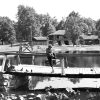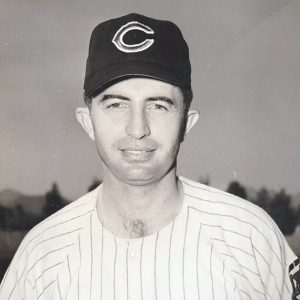calsfoundation@cals.org
Ransom Joseph (Randy) Jackson (1926–2019)
Randy Jackson was a talented multi-sport athlete who played approximately ten years with three different major league baseball teams in the 1950s. During his collegiate and professional athletic careers, the Little Rock (Pulaski County) native received recognition for his skills in both baseball and football.
Ransom Joseph (Randy) Jackson was born in Little Rock on February 10, 1926, to Ransom Joseph Jackson, who was a cotton broker and insurance salesman, and Ann Polk Coolidge Jackson. He had a younger sister, Suzanne.
Ransom grew up in Little Rock attending what is now Central High School. Sports were severely cut during his time at the school due to World War II. Neither football nor baseball were played, leaving Ransom to participate in track and field and golf. He played baseball in a local league but played little organized baseball as a young man.
After graduating from high school in 1943, he enrolled in the University of Arkansas (UA) in Fayetteville (Washington County). While attending college, he faced military service, either through volunteering or being drafted. He had an interest in becoming a pilot and learned of a naval officer training program offered at Texas Christian University (TCU) in Fort Worth. He transferred from Fayetteville and enrolled in the program at TCU. When the war ended in 1945, the program was closed at TCU, and the students were transferred to the University of Texas (UT) in Austin, from which he graduated with a degree in business and an ensign’s commission in the U.S. Navy. Instead of active service, Jackson was able to complete his military obligation through the Navy Reserve.
Jackson participated in football and baseball while attending both TCU and UT. As a result of the shortage of players due to the war, Jackson was asked to join the TCU football team as a punter and running back. During his single year at TCU, the football team won the Southwest Conference title and played in the Cotton Bowl, where they were beaten by Oklahoma A&M (now Oklahoma State University). Jackson had more success in baseball—as a third baseman, he led the conference in batting average.
Jackson continued his college football and baseball careers after transferring to UT. During the first of his two years at Texas, the football team won the conference title and participated in the Cotton Bowl, defeating the University of Missouri. Jackson gained the distinction of being the only player to play for different teams in consecutive Cotton Bowls. Jackson also continued to excel in baseball at UT.
Shortly after graduation, Jackson began playing semi-pro baseball in eastern Texas, earning $400 a month and playing on the Texas state championship team. Jackson had previously drawn interest from the Chicago Cubs, and with the success of his semi-pro career, he was offered a tryout. In late 1947, he was signed by the Cubs but was assigned to the minor league Class A Des Moines Bruins, earning the sixth-highest batting average in the league and being named to the Western League’s All-Star team. He was assigned to the Pacific League in 1949, but after fourteen games, he was sent to the Texas League.
Jackson had played well in the minors, and in 1950 he made the Cubs’ roster and made his major league appearance on May 2, 1950. By the end of May, his low batting average resulted in him being sent back to the minors, this time to Springfield, Massachusetts, in the International League. He was named the league’s Rookie of the Year and, by September, was recalled by the Cubs. For the next five years, Jackson played third base for the Cubs; in 1954 and l1955, he was named to the major league’s All-Star team.
His success with the Cubs drew interest from other teams, including the Brooklyn Dodgers, who were searching for a replacement for Jackie Robinson, who had broken the color barrier in major league baseball. Robinson was approaching retirement, and the Dodgers were looking for someone to cover his position at third base. Jackson was traded to them after the 1955 season to fill that role. Jackson started for the Dodgers until he cut his hand and had to recuperate for about two weeks. Missed games and a sub-par performance when he returned saw him replaced by Robinson. The Dodgers went on to win the World Series that year, with Jackson appearing as a pinch hitter in three hitless attempts.
Robinson retired in 1957, and Jackson assumed Robinson’s starting role until he suffered a knee injury after fewer than ten games. Placed on the disabled list, he did not return until mid-July. During the remainder of the season, the Dodgers played six different third basemen. The Dodgers moved to Los Angeles at the end of the season, but on September 28 Jackson hit the last homerun hit by a Brooklyn Dodger.
Jackson moved with the team to Los Angeles but played in only thirty-five games in 1958. He was waived by the Dodgers and picked up by the Cleveland Indians in August. The next spring, he returned to the Cubs but was released in October. Shortly after his release, he announced his retirement from baseball from his home in Athens, Georgia.
During his career, he played in 955 games, had 835 hits, and finished with a lifetime batting average of .261. He also hit 103 home runs and had 415 runs batted in.
In 1952, Jackson married Ruth Fowler. The couple had three children before their divorce in 1968. He married Terry Yeargan in 1972. Yeargan had two children from a previous marriage, and she and Jackson had a son.
After retiring from baseball, Jackson sold insurance, something that he had done in the baseball off season. In retirement, he worked for the Georgia International Life Insurance Company. He was also the co-founder of the Athens Boys and Girls Club. He was inducted into the University of Texas Hall of Honor in 1989. In 2016, he published his autobiography, Handsome Ransom Jackson: Accidental Big Leaguer. Jackson died in Athens on March 20, 2019.
For additional information:
Jackson, Ransom. Handsome Ransom Jackson: Accidental Big Leaguer. Baltimore: Rowman and Littlefield, 2016.
Marble, Steve. “Ransom ‘Randy’ Jackson, the Oldest Dodger and Last to Homer for Brooklyn, Dies at 93.” Los Angeles Times, March 21, 2019. https://www.latimes.com/local/obituaries/la-me-ransom-randy-jackson-dead-20190321-story.html (accessed January 19, 2023).
“Randy Jackson.” Baseball-Reference.com. https://www.baseball-reference.com/players/j/jacksra01.shtml (accessed January 19, 2023).
Zerby, Jack. “Randy Jackson.” Society for American Baseball Research. https://sabr.org/bioproj/person/randy-jackson/ (accessed January 19, 2023).
Mike Polston
CALS Encyclopedia of Arkansas








Comments
No comments on this entry yet.